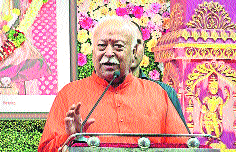Don’t rake up Ram Mandir-like issues elsewhere: Bhagwat
21 Dec 2024 10:36:36

PUNE
Rashtriya Swayamsevak Sangh (RSS) chief Mohan Bhagwat has urged for unity and harmony in the country, stressing that divisive issues should not be raised to create enmity, even as he highlighted the importance of the Ram Temple in Ayodhya as a symbol of Hindu devotion.
Speaking at the inauguration of the Hindu Sewa Mahotsav in Pune on Thursday, Bhagwat said, “Coming to the question of devotion. There should be a Ram temple, and it indeed happened. That is a site for the devotion of Hindus.”
However, he cautioned against creating divisions. “But raking up new issues every day for disdain and enmity should not be done. What is the solution here? We should show the world that we can live in harmony, so we should have a little experiment in our country,” the RSS chief added.
Highlighting India’s diverse culture, Bhagwat said, “We have ideologies of different sects and communities in our country.”
Bhagwat also spoke about Hinduness as an eternal dharma, stating that the Acharyas of this eternal and Sanatan dharma follow the “sewa dharma,” or the dharma of humanity. Addressing the audience, he described Sewa as the essence of Sanatan
Dharma, transcending religious and social boundaries. He urged people to embrace service not for recognition but for the pure desire to give back to society.
The Hindu Sewa Mahotsav, organised by the Hindu Adhyatmik Sewa Sanstha, is being held at the Shikshan Prasarak Mandali’s college
ground and will continue until December 22. The festival showcases various social service works from temples, religious organisations, and monasteries in Maharashtra, alongside information about Hindu culture and rituals.
Bhagwat underlined that Sewa should be performed humbly, without any desire for publicity. He stressed the need to adapt service to the needs of the land and time, advocating a balanced approach. While acknowledging the importance of earning a living, he reminded people to always give back to society through acts of service.
According to
Bhagwat, the essence of human dharma is to serve the world, and initiatives like the Hindu Sewa Mahotsav inspire the younger generation to adopt the path of selfless service.
Swami Govind Dev Giri Maharaj spoke about the deep-rooted connection between service, land, society, and tradition. He cited historical examples like Chhatrapati Shivaji Maharaj and Rajmata Jijau, who exemplified selfless service. He defined charity as sharing one’s blessings with others without seeking gratitude.
ISKCON leader Gaurang Prabhu underlined the three pillars of Hindu Sanatan Dharma--charity, ethics, and realisation--and highlighted the shared spiritual foundation of Hindus, Jains, Buddhists, and Sikhs. Labhesh Muni Ji Maharaj echoed these sentiments, describing the Hindu Sewa Mahotsav as a platform to strengthen cultural identity for future generations.
The event concluded with a Pasaydan (prayer) and a performance by students of Mook Badheer Vidyalaya, showcasing the art and culture of the hearing-impaired community.
The Hindu Sewa Mahotsav not only celebrates Hindu culture but also underscores the importance of Sewa as an essential part of the social fabric.